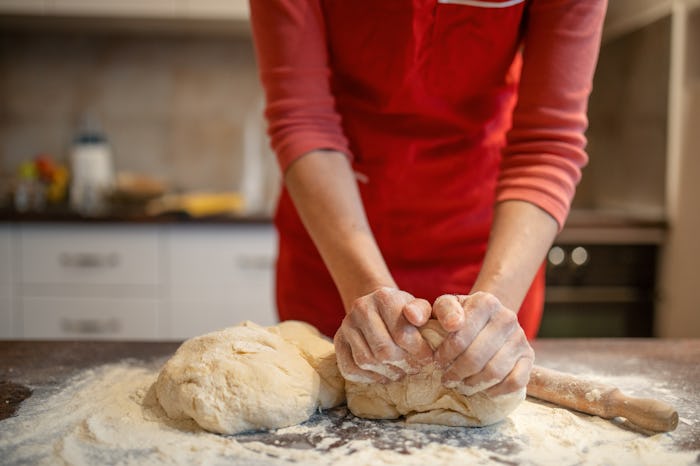Life

Your Need To Bake Bread & Knit During This Pandemic Is Pure Instinct, Experts Say
If there's one thing I know about my anxiety, it's that the moment there is any sort of crisis, I'm going to bake bread and stockpile butter. My husband's anxious mind will invest in air filters and herb gardens. Why do we do this? Why do we all suddenly become homesteaders during a crisis, focusing on baking bread while a coronavirus pandemic rages on?
Right now, the stores are sold out of yeast, knitting books are flying off the shelves, and good luck finding the "good" chocolate chips. People are Googling everything from "how to grow your own food" to "how to brew your own beer." In times of crisis, is this pioneer attitude in response to anxiety, or is it simply because people are anticipating boredom and have decided to take up a new hobby? It turns out that it could be a bit of both. Author Elizabeth Segran wrote for Fast Company, "Since hobbies inherently require learning new skills, they’re an important way for us to keep our minds sharp," and that "research has found that pursuing these sorts of activities is good for both your physical and mental health." Baking, knitting, even prepping is a hobby activity to some degree, and engaging in these hobbies during times of intense stress can be extremely beneficial to your body and mind.
Psychologist Dr. Carla Manly, author of Joy From Fear, tells Romper that the flip side is pure instinct-driven practicality. "During a crisis, people tend to move into a protective mode. As they emotionally and physically 'hunker down' to protect themselves and their families, it's common to think of basic ways to be self-sufficient." For some of us, that's baking six loaves of challah; for others, it's learning to knit or give home haircuts. (Please don't ask about or look at my daughter's undercut.)
My hobby of baking and home organization has saved me so many times since I live in New York City and we've been through several catastrophic crises in the last 20 years. Other than COVID-19, we've had Hurricane Sandy, an MTA strike, and various levels of security threats. I perhaps remember Sandy the most vividly. In those few days before our ocean overwhelmed us, I went to Costco and bought a pound of yeast, 20 pounds of flour, four dozen eggs, and way, way too much soy milk. My husband was similarly swept up in the onslaught. That man bought enough AA batteries to power a Tesla from New York to Los Angeles, as well as multiple cases of potato chips and popcorn. We have very distinct priorities.
Manly says this behavior of preparedness is absolutely rooted in our collective subconscious, noting that being in crisis usually "leads to a surge in activities that are reminiscent of pre-industrial times such as making bread, soap, candles, and homestyle cooking. These activities tend to make people feel as they are self-sufficient and able to handle anything that comes their way." It's that feeling of "I may be quarantined, but I can feed and clothe my family."
"This is an important, primitive urge, for it allows people to feel competent, resilient, and self-reliant during uncertain and challenging times," Manly says. Let us accept it, offer grace to the stores that have run out of yeast or bread flour, and concentrate on being good to ourselves and to each other. We aren't just preparing to be ready for crisis; we are preparing also to be a community once again when this is all over.
If you think you’re showing symptoms of coronavirus, which include fever, shortness of breath, and cough, call your doctor before going to get tested. If you’re anxious about the virus’s spread in your community, visit the CDC for up-to-date information and resources, or seek out mental health support. You can find all of Romper’s parents + coronavirus coverage here, and Bustle’s constantly updated, general “what to know about coronavirus” here.